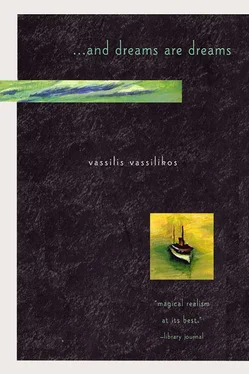Vassilis Vassilikos - ...And Dreams Are Dreams
Здесь есть возможность читать онлайн «Vassilis Vassilikos - ...And Dreams Are Dreams» весь текст электронной книги совершенно бесплатно (целиком полную версию без сокращений). В некоторых случаях можно слушать аудио, скачать через торрент в формате fb2 и присутствует краткое содержание. Год выпуска: 1995, Издательство: Seven Stories Press, Жанр: Современная проза, на английском языке. Описание произведения, (предисловие) а так же отзывы посетителей доступны на портале библиотеки ЛибКат.
- Название:...And Dreams Are Dreams
- Автор:
- Издательство:Seven Stories Press
- Жанр:
- Год:1995
- ISBN:нет данных
- Рейтинг книги:3 / 5. Голосов: 1
-
Избранное:Добавить в избранное
- Отзывы:
-
Ваша оценка:
- 60
- 1
- 2
- 3
- 4
- 5
...And Dreams Are Dreams: краткое содержание, описание и аннотация
Предлагаем к чтению аннотацию, описание, краткое содержание или предисловие (зависит от того, что написал сам автор книги «...And Dreams Are Dreams»). Если вы не нашли необходимую информацию о книге — напишите в комментариях, мы постараемся отыскать её.
...And Dreams Are Dreams — читать онлайн бесплатно полную книгу (весь текст) целиком
Ниже представлен текст книги, разбитый по страницам. Система сохранения места последней прочитанной страницы, позволяет с удобством читать онлайн бесплатно книгу «...And Dreams Are Dreams», без необходимости каждый раз заново искать на чём Вы остановились. Поставьте закладку, и сможете в любой момент перейти на страницу, на которой закончили чтение.
Интервал:
Закладка:
On the whole, therefore, I am well. Amidst the general misery of my country and my people, I am still behaving relatively optimistically. Proof of that being that I’m still in the mood to type. The required amount is at least three pages a day. Let us get to three pages to start with, and then we can move painlessly to five, eight, sometimes even ten, on those days when inspiration fills my sails, a wind that tears itself against the riggings and masts, a nor’wester, as it’s called. A moment will arrive, during this digging up of feelings, when I will identify with the universe, with the deeper path of life, when I will surpass myself and then, as gambling people say, I will have hit the jackpot. I will feel like a writer worthy of his mission. But until then, I must walk a long, joyless, monotonous road, overgrown with nettles and thorns. The peaks are few.
And precarious. And the road that leads to them seems interminably long!
It was from such a peak that our friend the bear descended. It had been living free in the mountain when its lair was discovered by some topographers who were taking measurements for the digging of a tunnel through the mountain — that of Ahladokambos to be precise — in order to shorten the road leading into the interior of the Mani. They took the bear and brought it to the town of Kalamata. That way, while it was still a cub, the bear associated with people and came to know their peculiarities. It lived as a domesticated animal until the day when, the daughter of the topographer having gotten involved with a gypsy (the one who had relieved her of the little gold chain around her ankle), the young bohemian spoke to his father about a bear that lived, if you please, in the backyard of his girlfriend’s house. The gypsy’s father went and asked the girl’s father not for his daughter, but for his bear. In order to sell, the topographer would have to get permission from his daughter, who had become attached to the animal. His daughter, Aliki from Kalamata (four as in a row: Kavála has but three, Patras, two, and Tziá a single one), in accordan in his garden and had made him the laughingstock of the neighborhood. One neigh ce with her friend the switch-hitter, told her daddy that he could give the bear to the man who wanted to buy it. The young gypsy, who was turning her on, had made this a condition of their love affair continuing.
The topographer was gladly rid of the animal, which had caused all kinds of problems in his garden and had made him the laughingstock of the
neighborhood. One neighbor in particular, Manolis from America, had suffered an accident in Chicago and was not all there, poor man. Every time Manolis saw the topographer, whether in the street or the cafe, Manolis would ask him, at the top of his voice, how his bear was doing.
And so it was that, from the mountain heights of Ahladokambos, after a brief sojourn in Kalamata, the bear found itself in the hands of the gypsy, who took it to Athens for the Christmas holidays, obeying that ancient custom that dictates that gypsies with bears should wander through various neighborhoods collecting money by making the bear do certain tricks.
Now, how the bear came to get lost in the concrete city of Athens and how it was picked up by the traffic policeman at the junction of Third of September and Alkouli Streets and hand ed over to Police Lieutenant Livreas, we will see presently.
But first, a few words on the sexual attraction between Aliki and the young gypsy who had relieved her of the small gold ankle chain; and a few words also on the consequences that the disappearance of the bear might well have had on the cultural life of Kalamata.
I should point out that it is purely coincidental that the young girl in our story has the same name as my friend, from whom I am expecting a tender phone call at any moment. It is one of those coincidences that occur both in life and in fiction. Nothing more. No further symbolism or thought association intended.
Aliki from Kalamata is a high school senior with an acne-covered face. She goes to the cafes in town, where she sees the boys sitting around talking about motorbikes and soccer, but she avoids coming in contact with them.
On the outskirts of Kalamata, as almost
everywhere in Greece, lies a semipermanent gypsy camp, which provides the town with vegetables, Nissan pickups, seafood, fortune-tellers, witches, songs by Manolis Anghelopoulos and Jehovah’s Witnesses. As she strolled by the cafes with their plastic chairs and ice coffees, and the discos with their video clips, the young Aliki had decided to strike back at her acne vulgaris and cure it — something no dermatologist had succeeded in doing so far — by surrendering to a vulgar entanglement with the young gypsy. This assignation took place one evening that May as her grandmother was in the garden, killing a chicken for the feast day of Saints Constantine and Helen, which also happened to be the names of Aliki’s father and mother. The young gypsy was stealing plums when Aliki saw him and said: “Wait, you don’t have to steal them. I’ll give them to you.” The gypsy couldn’t have asked for more. The household seemed like a privileged one. Aliki gathered lots of plums in her apron and took them to him just as the chicken fluttered in the old woman’s hands, breathing its last.
As she lifted her skirt, the gypsy saw Aliki’s pretty legs and became flustered. Twilight was falling, nobody could see them. Thus it came about that, amidst the intoxicating fragrances of spring, Aliki gave him the gift of her first sigh, her first spasm, that coincided with the chicken’s last one. From then on, every evening at six o’clock sharp, at the bottom of the garden, she would meet her friend, who was in no danger of compromising her in the cafe where her friends hung out, since gypsies were not allowed inside. Besides, her swarthy lover was very sexy.
It was during that summer that her father, Constantine, who had a thick mustache and was a militant supporter of the Socialist Party, was awarded the contract for the digging of the tunnel that would shorten the national road between Athens and Kalamata by two whole hours, and, having come across the white bear in the mountains, had brought it home as a gift to his daughter. And it was during the same summer that the young gypsy, fancying the idea of a bear, had spoken about it to his father, the chief of the gypsy camp. All of which led to the bear, aged only a few months, walking around Athens during the Christmas holidays.
As for the cultural life of Kalamata, no, the bear was not missed at all: a very active mayor had turned this town into a little Paris.
On the other hand, the bear had been something of a consolation in Athens, first cultural capital of Europe, until the moment when it got lost at the junction of Third of September and Alkouli Streets and put itself obediently into the hands of the police officer, who led it, according to regulations, to the traffic police headquarters nearby on Saint Constantine Street, as the bear had been obstructing traffic. The usual circulation restrictions in the center of town had been lifted because of the holidays, and the traffic was absolute chaos.
— 2-
Whereupon in Athens, First Cultural
Capital of Europe, the Sight of a White Bear Still Draws People’s Attention
We are not among those who doubt that whatever was done was done well. However, our gypsy started off from Kalamata in his Nissan pickup with Aliki the bear tied on the flatbed amidst wishes for a bon voyage; like another Zampano, he took his own Strada.
He made his first stop in Nafplion, first capital of the modern Greek state, before Athens. The summer Lotharios were resting up in the wintry square below the fortress of Palamidi, listening to the latest Harry Klynn7 tape at full blast. The sight of the bear excited them. At Corinth Canal, where he stopped next, everybody was eating souvlaki and listening to the same tape. The gypsy listened carefully to find out what people were laughing at. He heard about how different politicians acted in Parliament, about soccer players, and about well-known entertainers. During the next few days, he taught all these things to his bear, who would mimic them with an acting talent as great as, if not greater than, that of the movie star who was also called Aliki. The bear would mimic the top Socialist minister speaking in Parliament, the goalkeeper Sarganis diving to save the ball, and the president of the republic embracing his wife.
Читать дальшеИнтервал:
Закладка:
Похожие книги на «...And Dreams Are Dreams»
Представляем Вашему вниманию похожие книги на «...And Dreams Are Dreams» списком для выбора. Мы отобрали схожую по названию и смыслу литературу в надежде предоставить читателям больше вариантов отыскать новые, интересные, ещё непрочитанные произведения.
Обсуждение, отзывы о книге «...And Dreams Are Dreams» и просто собственные мнения читателей. Оставьте ваши комментарии, напишите, что Вы думаете о произведении, его смысле или главных героях. Укажите что конкретно понравилось, а что нет, и почему Вы так считаете.












